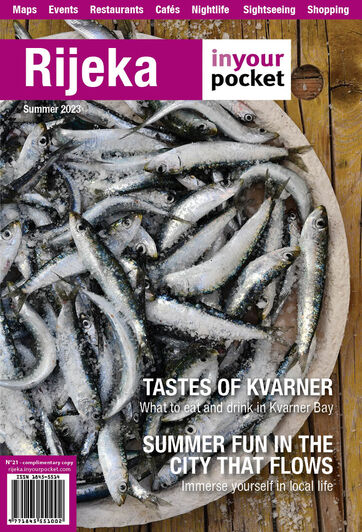Janko Polić Kamov
more than a year agoSculpted by Zvonimir Kamenar in 2000 it portrays Janko Polić Kamov (1886-1910), the Rijeka-born writer who blazed a brilliant path through the world of modernist poetry, fiction and non-fiction before dying in Barcelona at the tender age of 24.
Rijeka is enormously proud of Kamov, a key figure in the Croatian literary canon who would be as internationally crucial as Camus, J.D. Salinger or Arthur Rimbaud if only his oeuvre was more widely known. With the onset of Rijeka 2020 and the international focus on the city’s cultural heritage that will undoubtedly come from that, maybe the time has come for Kamov to make the belated jump from Croatian cult to global classic. The recent publication of his short stories in English, Farces & Novellas (available from Barnes & Noble, Amazon and other online bookstores as an e-book or digital print), certainly provides the necessary literary springboard.
Janko Polić was born on November 7 1886 in the eastern suburb of Sušak. His merchant father was the co-founder of Polich, Minach et Comp., Rijeka’s biggest department store, and also a key figure in publishing Croatian patriotic newspapers. This bourgeois-patriotic background provided Polić junior with plenty of reasons to become a rebel.
Polić’s high-school days saw his bolshy instincts emerging. He co-founded a short-lived nationalist group called Cefas which harboured lofty but unfulfilled ambitions to fight the Austro-Hungarian state with terrorism. Expelled from school after spitting in the face of a teacher who gave him too high a mark, Polić ended up in the Ožegovićianum, a church-run boarding school in Senj, an experience which if anything hardened his rebellious nature.
When his dad’s business went down the drain the family moved to Zagreb, where the teenage Janko was introduced to the world of cafes and brothels. Aged 18 he joined a travelling theatre troupe as a prompter and occasional actor, travelling through Dalmatia and Bosnia and generally living a bohemian life. His father and mother died in 1905 and 1906 respectively, removing any firm anchor to settled family life. Polić was an inveterate traveller, a kind of cultural nomad before his time, spending a lot of time in northern Italy and becoming fascinated by the cities of the Mediterranean rim. He spent several summers on the island of Krk and also made fleeting return visits to Zagreb before heading for Barcelona on his final journey in June1910.
Adopting the nickname Kamov (based on the Biblical Ham, son of Noah, who once found his father drunk and naked), Polić had begun contributing essays and criticism to Zagreb journal Pokret in early 1907. His collections of poetry, Psovka (Profanity) and Ištipana hartija (Pinched Paper), both published in 1907, were precocious, morbid and morally ambiguous “I will rape you, blank paper” he wrote in the poem “Prelude”, setting out a provocative writing programme to which he remained true for the rest of his life. Kamov’s short stories, Knjiga lakrdija i novela (1908) read like a series of dispatches from the bohemian-misfit world which Kamov had chosen to inhabit.
Kamov’s Isušena kaljuža (“The Drained Swamp”), an avant-garde, almost stream-of-consciousness novel before its time, was written in three blocks beginning in Zagreb in 1906 and finished off during Italian travels of 1909. It wasn’t published until 1956, when poet and publisher Dragutin Tadijanović set to work organizing Kamov’s collected works.
Indeed the initial reaction of the Croatian literati to Kamov’s oeuvre was at the outside rather ambiguous. Aside from poet and revolutionary Vladimir Čerina, who set himself the task of bringing Kamov’s work to a wider audience after his death, Kamov was regarded by most of his Croatian contemporaries as a promising writer full of potential who had published too much unpolished work too early in his career. They also had a problem with the fact that Kamov was not a socially engaged writer. He was too distrustful of Croatian nationalism to appeal to a patriot like Antun Gustav Matoš, and too disinterested in politics to get the unconditional thumbs up from committed lefties like Miroslav Krleža. Nowadays it is the prose of Matoš and Krleža that seems slightly archaic, and it’s Kamov who speaks to us in the direct, edgy, disturbing voice of a writer who could quite easily be one of our contemporaries.
The other problem that Croatian writers had with Kamov was that they found it difficult to tell which literary genre he belonged to. Kamov’s writing anticipated lots of twentieth-century avant-gardes but he was writing at a time when none of those avant-gardes had yet been given a name. There are elements of
Futurism in his prose, especially in the non-fiction pieces he wrote for Pokret. However the Futurist movement wasn’t launched until 1909, by which time Kamov had already established his own style; he was a writer doing his own thing at a time when there were no clear manifestos to follow.
Kamov’s piece “Beneath the Aeroplane”, written in Bologna in May 1910, is part reportage, part opinion-piece and part free-flowing prose poem; precisely the kind of ambitious non-fiction writing that gets published in American literary journals today.
It’s arguably as a precursor of existentialism that Kamov should be best appreciated. His stories are full of loners and rebels who feel out of place, unsure of what to commit themselves to, unable to say whether alcohol and sex constitute dissipating vices or a worthy modern occupation. “I cannot imagine anything more insane than our life, our Earth, our people, and our comprehension of this insanity” ran one of Kamov’s aphorisms, published posthumously in the Italian literary magazine Lacerba in 1913.
It’s high time the international reading community to get to grips with Kamov, and the short stories contained in Farces & Novellas are the best places to start.





Comments